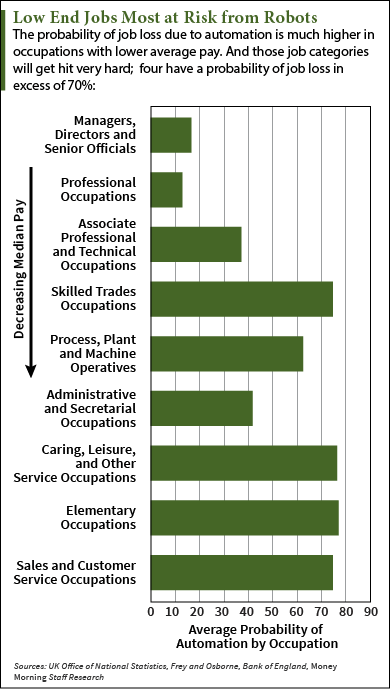Automation is a great thing - except for a lot of people looking for U.S. jobs.
Over the next 10 to 20 years, half of all working Americans could find themselves replaced by some type of robot. That's what the Bank of England's chief economist, Andy Haldane, said in a speech last week to the Trades Union Congress in London.
 Haldane said the United States stood to lose as many as 80 million jobs to automation, and the UK 15 million. In October, the total number of non-farm jobs in the United States stood at 142,654, according to the U.S. Bureau of Labor Statistics.
Haldane said the United States stood to lose as many as 80 million jobs to automation, and the UK 15 million. In October, the total number of non-farm jobs in the United States stood at 142,654, according to the U.S. Bureau of Labor Statistics.
The "robots taking jobs" trend is already underway in many low-skill sectors such as retail and restaurants.
You may have already noticed the "self-checkout" lines at your local grocery store or at Home Depot Inc. (NYSE: HD).
As part of its turnaround plan, McDonald's Corp. (NYSE: MCD) has begun to install self-serve touchscreen ordering kiosks. Chili's restaurants are using 45,000 tablets to take customer orders.
But Haldane warned that low-skill jobs won't be the only ones wiped out by automation.
Robots Taking Jobs from All Sectors
"These machines are different," Haldane said. "Unlike in the past, they have the potential to substitute for human brains as well as hands."
That means in addition to the impact on customer service and factory jobs you'd expect, we'll see big losses in skilled trades and administrative occupations. Nearly all job categories will be affected to some degree.
Those seeking a silver lining say that technological disruption always has destroyed jobs while creating new ones. For example, nine of the 10 jobs in the most demand in 2012 didn't exist just a decade earlier.
"We used to have a huge percentage of people working on farms. Now we don't. We used to have a lot of elevator operators, now we don't," Jeff Burnstein, president of the Association for Advancing Automation, told The Washington Post. "We've always been able to create new jobs. Twenty years ago, was there a job called an app developer? How about an SEO specialist, or a social media director?"
The concern now is that the destruction of old occupations and the creation of new ones is happening at a faster and faster pace.
And that will have these grave implications for American workers...
Better Robots Means Less Work for Humans
That's making it harder for workers to adapt as they have in the past, when many of the displaced were able to "skill up" to even better paying jobs.
Plus, the technology is gaining capabilities at a rapid pace. That may leave less and less work for humans to do.
"The smarter machines become, the greater the likelihood that the space remaining for uniquely human skills could shrink further," Haldane said.
The risk is a workforce with few very highly skilled workers able to earn top wages and depressed wages for everyone else - those left to fight over lower-skilled jobs that still require a human.
It's a scenario that U.S. President Barack Obama sees happening even now.
"So even if the jobs are being created, companies don't feel obliged to give people raises as demand for their products go up," President Obama told Marketplace last month. "They can say to themselves, 'You know what, we'll just invest in more automation instead of hiring more workers, or if we do hire more workers, we'll tell them, 'This is how much we can afford, and if you want more, then we know that there's a bunch of other people that we can get.'"
[mmpazkzone name="in-story" network="9794" site="307044" id="137008" type="4"]
Follow me on Twitter @DavidGZeiler or like Money Morning on Facebook.
Income Inequality Gets Worse: This year, income inequality reached record highs, according to the Organization for Economic Co-operation and Development. Across all OECD nations, the top 10% earns about 9.6 times what the bottom 10% earns, up from a factor of 7 in the 1980s. But the level of income inequality in the U.S. is much higher than the average...
Related Articles:
- Bank of England: Labour's Share - Speech by Andy Haldane
- The Washington Post: President Obama Puts His Finger on the Real Danger of Robots
- Marketplace: The Full Interview: President Obama Defends the TPP
About the Author
David Zeiler, Associate Editor for Money Morning at Money Map Press, has been a journalist for more than 35 years, including 18 spent at The Baltimore Sun. He has worked as a writer, editor, and page designer at different times in his career. He's interviewed a number of well-known personalities - ranging from punk rock icon Joey Ramone to Apple Inc. co-founder Steve Wozniak.
Over the course of his journalistic career, Dave has covered many diverse subjects. Since arriving at Money Morning in 2011, he has focused primarily on technology. He's an expert on both Apple and cryptocurrencies. He started writing about Apple for The Sun in the mid-1990s, and had an Apple blog on The Sun's web site from 2007-2009. Dave's been writing about Bitcoin since 2011 - long before most people had even heard of it. He even mined it for a short time.
Dave has a BA in English and Mass Communications from Loyola University Maryland.



